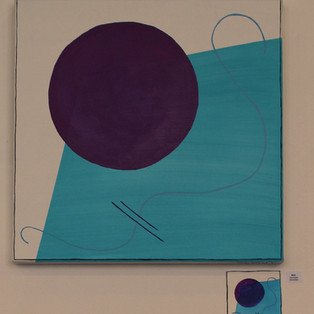The Geometric Abstraction Collection was not something that was built overnight. The first year that we lived in Stroud I was trying to balance everything that comes from moving to a new place, not knowing the area, starting to find a community and more. I found that my work started to reflect the hopefulness of starting fresh, at first I continued to play with simple forms and stuck with the primary colours. I slowly felt brave enough to expand the colour range and explore the compositional ideas. When I first started this project I called the work “simple beauty” but I knew this was a temporary title, it reflected the simple compositional forms and the vibrant beauty from the delicious colour palettes. I noticed that I was using the title “Geometric Abstractions” as a far more literal translation of what they are, plus it had the added bonus of removing the weight of the previous title, the expectation that they should be beautiful.

There was a lot of experimentation in the beginning and I often found that the success of the pieces relied on the choices that I made from the first moment. The colour pallets were similar as they reflected my preferences. However, the intention of the pieces were to have variety across their composition and colour palettes. They key shift for the project was when I was sketching one day with a biro and graph paper, as I was unable to paint them that day I recorded the composition ideas down. By breaking the process down into stages before painting onto the canvas’ I found pleasure from each stage, from the fast idea generation of the sketches to the meditative practice of painting, This new creative process also created the range of variety that I had been looking for.

For the first year, the Geometric Abstraction Collection was all done by hand on paper, with the colour tests also being done with graph paper and pen. These sketches were then painted, acrylic on paper, and given their official collection number which you can see on Instagram here. At first this worked well but I began to notice that I was potentially repeating sketches and losing track of what stage of creation some of the sketches were. The most recent transition for the Geometric Abstraction Collection has been to digitally copy every sketch and colour test and give each a number so that I can log them more effectively. I see this being a long term project and so it would be a nightmare to lose track of all of the pieces that I have or haven’t done.
While all this begins to explain the process of the collection it doesn’t properly explain why I get so much enjoyment from creating this way. it began as a celebration of rediscovering my vibrant colour palette and then became an obsessive creation method

where I play with colour, form and composition. However, I believe that this project is a continuation of the themes of my dissertation, as well as a slow personal reflection on my creative mind. Like a visual journal, if you were to scroll through each page you would see how the forms soften, sharpen, simplify or increase in complexity over time. Often reflecting back the emotional state of my being.
It makes me so happy when someone says to me that they have taken the time to look through some of the official collection studies, they then communicate which ones they do and don’t like. Perhaps, not really understanding why they have made those choices, this audience member has not only taken the time to look through the collection, but has considered their preferences. For what ever reason, one or two may have stood out to them and resonated with them.

This is, in my opinion, exactly what art should be, I work purely in abstraction so that the human brain can challenge its neural pathways to create connections. Perhaps one draws up a memory, or reminds you of a person, whatever the interaction is, be it positive or negative, the piece has given you a moment of pause and reflection.

I currently paint the collection studies at 3 sizes, each size alters the composition slightly and I use the square canvases so that I can alter the hanging orientation. What I want for the Geometric Abstraction collection is a pleasurable creation process, but what I am offering with the collection is a collection of work with an active relationship with its audience. Either through the nicknames that people give to the paintings, varied hanging positions when a painting is sold and curated to fit the buyers space or more recently I have been able to open up the creative process to interaction.
When I made the collection digital there was an added bonus that I was able to produce more sketches, more quickly. This opened up the colour tests to much more development as I could use one sketch to test multiple colour palettes. On Instagram, and Tiktok, I have begun to ask for colour combination examples and suggestions that I then test. This plus the use of the website coolors.com has resulted in a much more experimental process for the colour tests as it challenges me to use colours that are outside of my personal preferences. Also meaning that there is more options for audiences to find a collection study that resonates with them.
I hope that this is a useful introduction to the collection, I would welcome any questions you might have. There is a comment section below, or I can be contacted directly through social media.







Comments